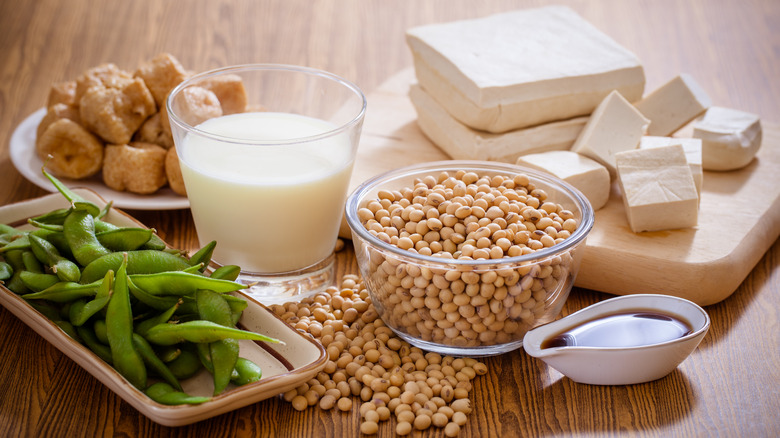The Polarizing Protein That Can Lower High Cholesterol
Cholesterol is that waxy stuff in your blood that helps your body produce healthy cells, but too much of it can clog your arteries. It's the low-density lipoprotein, or LDL, that can build up along your artery walls. High-density lipoprotein (HDL) whisks away the extra cholesterol in your blood so your liver can metabolize it. A lack of exercise, smoking, excess alcohol, and obesity can send your cholesterol levels to unhealthy heights. Eating a low-sodium diet rich in fruits, vegetables, and whole grains while limiting animal fats can help reduce your cholesterol (per Mayo Clinic).
The U.S. Food and Drug Association said in 1999 that soy food companies could promote the claim that soy protein can lower your risk of heart disease. The FDA then pulled back this claim 18 years later because newer research found inconsistent results. However, a 2019 article in the Journal of Nutrition analyzed the studies that the FDA reviewed and found that soy protein can lower your LDL cholesterol levels by an average of 3.2%.
How soy protein lowers cholesterol
Soy proteins and peptides boost the activity of LDL receptors that control cholesterol levels in your cells, according to a 2021 article in the International Journal of Molecular Sciences. Certain soy protein peptides also reduce cholesterol production and help cells take in HDL cholesterol. These peptides also bind with bile acids in the liver to further reduce cholesterol. Another soy protein contains peptides that work like cholesterol-lowering medications.
The American Heart Association questioned the FDA's decision to revoke its health claim regarding the effectiveness of soy protein in reducing cholesterol. A 2019 review of the Journal of the American Heart Association compared the previous research done in 1999 to the evidence the FDA used to question its original claim. In 1999, the average LDL reduction was 6.3 milligrams per deciliter (mg/dL), and in the research after 1999, this reduction ranged from 4.2 to 6.7 mg/dL. Soy protein can be effective for specific populations that might see their cholesterol levels increasing. A 2019 analysis in Critical Reviews in Food Science and Nutrition looked at 46 trials and found that consuming isolated soy protein can significantly reduce total cholesterol, triglycerides, and LDL cholesterol in postmenopausal women.
Soy has other health benefits
Soy got a bad rap several years ago when some claimed that soy could cause breast cancer or dementia. Yet the Harvard School of Public Health says much of the research lacks enough evidence. Some of the differences in research can be attributed to the types of soy foods used in the studies, such as the minimally processed soybeans themselves and the processed soy cheeses and veggie burgers. Soy has been linked with improved cognition, a decreased risk of prostate cancer, and reduced menopausal hot flashes.
According to a 2017 review in Nutrients, consuming protein-rich soybeans is linked to a lower risk of cardiovascular disease, obesity, and type 2 diabetes in East Asian populations. The Western diet, genetics, and gut microbiome might interfere with the research on soy's potential health benefits. Soy and its components have been studied for their potential to reduce high blood pressure risk by promoting blood vessel dilation and inhibiting a key enzyme that regulates blood pressure. Soy's isoflavones, in particular, can increase your body's nitric oxide production to boost blood flow. These isoflavones can also ward off chronic conditions by suppressing the genes that promote inflammation.



